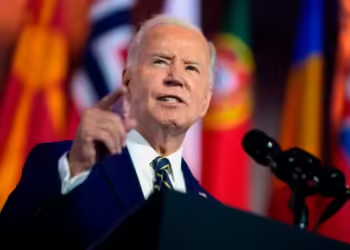Biden signs bill ending forced arbitration in sexual assault, harassment cases
The Washington Post
By Amy B Wang and Eugene Scott
President Biden signed into law Thursday a bill that ends forced arbitration in workplace sexual assault and harassment cases, allowing survivors to file lawsuits in court against perpetrators.
In a White House ceremony with members of Congress, Vice President Harris and former Fox News host Gretchen Carlson in attendance, the president said the secrecy of arbitration benefits companies, not victims, and keeps many of those impacted in the blind about an issue that needs more illumination.
“Between half and three-quarters of all women report that they have faced some form of sexual harassment in the workplace,” Biden said. “And too often they’re denied a voice and a fair chance to do anything about it. Today, we send a clear and strong message that we stand with you for safety, dignity and for justice.”
The new law will nullify agreements between employees and their employers in which the employees waive their rights to sue in the case of sexual assault or harassment and instead are required to settle their disputes by arbitration. Harris told those gathered that the new law will make America’s workplaces more just.
“Forced arbitration silences survivors of sexual assault and harassment,” she said at the event. “It shields predators instead of holding them accountable and gives corporations a powerful tool to hide abuse and misconduct.”
Critics of forced arbitration say that the practice has served only to further cultures of abuse in workplaces and that the new law would be critical for holding perpetrators of sexual misconduct accountable. About 60 million Americans are subject to arbitration clauses, and many of them do not know it because the provisions are buried in the fine print of their employment contracts.
“We can’t ignore a basic reality of these clauses: They deprive victims of sexual harassment and assault of their basic rights by mandating that they seek remedy only behind the closed doors of private arbitration, with no other alternative,” Senate Majority Leader Charles E. Schumer (D-N.Y.) said on the Senate floor Thursday morning.
The Ending Forced Arbitration of Sexual Assault and Sexual Harassment Act, which was first introduced in 2017 by Sens. Kirsten Gillibrand (D-N.Y.) and Lindsey O. Graham (R-S.C.), was a rare product of bipartisan congressional support. The #MeToo movement helped spur momentum for the bill after more victims spoke out about how they could not sue perpetrators because they had unwittingly signed such clauses.
Last month, the House passed the bill, 335-97; the Senate passed it on a voice vote. Gillibrand touted it then as “one of the most significant workplace reforms in American history,” while Graham defended the bill against some Republican criticism that it would be bad for businesses.
“It does not hurt business to make sure that people who are harassed in the workplace get treated fairly,” Graham said then.
Carlson, who was a key proponent of the bill, said in advocating for it that she had been shocked to learn that her employment contract included a forced arbitration clause. Her lawyers initially said the clause meant she could not sue then-Fox News CEO Roger Ailes, whom she accused of sexual harassment.
Carlson told those gathered for Thursday’s bill signing that it was the culmination of a five-year journey of hard work and perseverance to make sure women’s voices are heard.
“Today, I’m here on behalf of the millions of American workers who up until today have been voiceless, silenced for simply having the courage to come forward, to say something bad happened at work,” she said. “And in return, they got shunted into the secret chamber of arbitration.”
“I could have never imagined that five years ago after filing my harassment lawsuit against chairman and CEO of Fox News, Roger Ailes, that this day of real change could actually come back,” Carlson added.
In November, four sexual assault and harassment survivors testified before the House Judiciary Committee and described how being forced to go through the arbitration process only further traumatized them.
“To this day, whenever my career — my life’s work — is referenced, my accomplishments as an actor are ignored, and I’ve been reduced to being Eliza Dushku who was paid off for ‘allegedly’ being sexually harassed on a TV series,” Dushku, an actress and producer, said in her testimony. “As I hope you understand, this was not the outcome I desired or ever expected, but because of binding arbitration there will never be real justice for me and for countless other victims of sexual harassment.”
Amy B Wang is a national politics reporter. She joined The Washington Post in 2016 after seven years with the Arizona Republic.
Eugene Scott is a national political reporter on The Post’s breaking news team. He previously wrote about identity politics for The Fix. And he also hosted “The Next Four Years” podcast available exclusively on Amazon Music.









